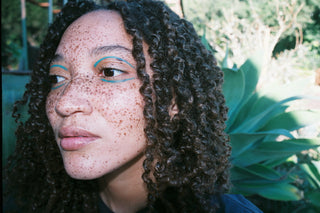We all enjoy taking some time to find the perfect skincare products that suit our skin. Especially if our skin is sensitive and requires some additional attention. We also love to have silky, shiny, voluminous hair. So we are dedicated to finding perfect hair care products that will help us achieve those goals. But have you ever thought about how hair care and skincare products must be compatible because both types of products affect both skin and hair?
Most people overlook this and are surprised to notice that, even when they have a perfect skin care routine, skin problems do not stop appearing. Or that their hair does not look as they would like, despite the fact that their hair care routine is top notch. If you haven't been aware of how much hair care and skincare overlap, here’s a little breakdown.
So, how can your hair care routine affect your skin?
The first thing we want to establish here is that hair care products really can affect the skin on your face. If something comes in contact with the hair - it also comes into contact with the skin. It is quite logical if you think about it, but that doesn’t change the fact that we still overlook it more often than we should.
If your skincare ingredients and products are stellar and you’re looking for a source of unexplained dermatitis or irritation - it could be the hair products you’re using.
Here are some of the ways your hair care products travel onto your face: they can come in contact with your skin during rinsing in the shower, or from wearing your hair down where it touches your cheeks, if you have bangs - then your forehead is in constant contact with whatever hair products are in there, also while sleeping, from a pillowcase.
Imagine washing your face with shampoo. We believe that you would not dare to undertake this endeavor. However, this is exactly what happens during simultaneous hair washing and showering. Yes, hair products in this case come into contact with the skin for a quite short time, but if you have sensitive skin, it can be enough for your skin to start reacting.
During sleep, your hair products are transferred to the pillowcase and stay there until you replace it with a new one. This means that every night (and day if you like naps), your skin comes in contact with the ingredients from the hair products.
Leave - in products are doubly suspect. Dry shampoos, styling products, leave in conditioner…mmmm…all that fragranced mess going straight into your freshly cleansed face. So, you can imagine how this can eventually clog pores, lead to acne, irritation, dermatitis, and other undesired consequences on the skin.
If you notice that you have acne on your forehead, cheeks or back (pretty much anywhere your hair touches your skin), this may be a sign that the leave-in hair product is transferring to your skin and clogging your pores.
In case you notice that your hair products do not suit your skin, it is a good idea to eliminate them and try to find some that are gentler and less irritating to your skin. Avoid products with heavy fragrance.
Secondly, make sure that you always wash your face and body after you have finished washing your hair. After washing your hair, there is a chance that the remnants of shampoo or conditioner will remain on your skin, so it is necessary to wash them thoroughly in the end to ensure that there is nothing left that could be harmful to your skin.
If you have acne breakouts, consider giving your hair a break from leave-in products or if you must use them, change your pillow case more often, or wrap your hair during sleep.
How can your skin care routine affect your hair?
So far, we have talked about how hair care affects the skin, but keep in mind that the same goes with your skincare routine and your hair. Skincare products you use can definitely affect your hair. Sometimes the hair can get greasier if you’re using oily products. Also, the area around the hairline can become dry and flaky, or show bumps from improper care.
Hairline - is it a skincare zone or a hair care zone?
One of the common (and very good) questions is whether it is hairline skincare or hair care zone. Well, the right answer is that it is a bit of both.
However, the skin on your scalp is much thicker than the skin on your face. Plus, the scalp has more sebaceous glands than anywhere else on the body. So while your face may need more oil, if it travels to the scalp or rubs off on your hair, it will quickly make your hair look greasy.
You want to thoroughly clean and moisturize your hairline but avoid oily moisturizers in this zone. Something like our T-Zone is a great choice, because it hydrated the skin without depositing grease.
It is a good idea to occasionally do a chemical exfoliation using gentle exfoliating serum, such as our Nightly Calibrator. This step will remove any dead skin cells that have accumulated in the hair line region and prevent clogging pores.
Final word
We hope you now have a clearer picture of how hair care and skincare affect each other. And also, that you may have found the underlying causes of the problems you have with your hair and/or skin, despite the fact that you try to keep your routine flawless. We suggest that in the future you always consider whether a certain hair product is optimal from the point of view of both skincare and hair care and ensure that you achieve results on the skin and hair you desire!

